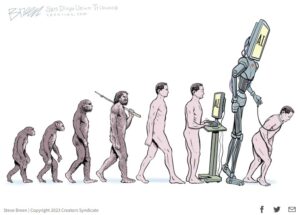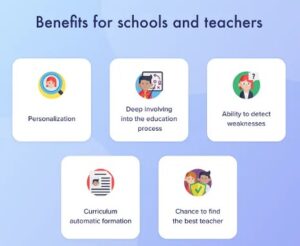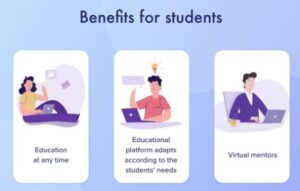AI technologies will revolutionize education for the better.
AI has seemingly come out of nowhere. I imagine this is how people felt when the (old ‘tech’) came about – printing press, video, internet, etc. . As time passed, those things became a part of our everyday lives. I cannot imagine why AI is not destined for the same. Both sides in this debate shared excellent presentations that were super persuasive, leading to a great discussion in class. I wonder if it is because out of all of the topics that were debated this year, this is one that we have the least experience with within our profession, and perhaps the one that makes us feel the most vulnerable as educators (that is where I stand).

Personalized Learning, Efficiency, and Innovation
Roksareh and Hanieh offered a lot of positives in how Artificial Intelligence (AI) is changing the way we learn and teach. With AI, students can learn at their own pace and receive personalized feedback. AI can also help teachers plan and collaborate more efficiently, saving time and resources. Plus, AI can simplify everyday tasks like searching for information and autocorrecting mistakes. In the future, AI will likely be used for more complex tasks like coding and generating ideas. There is capacity for AI to make learning more interactive and engaging, with access to digital materials and tools that can improve critical thinking skills. Of course, privacy and security are important considerations, but with the right guidelines, AI can be a valuable tool for education. It is becoming increasingly important to keep up with technology, and AI is no exception. By learning how to use AI effectively, we will be better prepared for the future and can approach education in a more inclusive and innovative way.

Alam (2021) has noted that AI technology has improved the quality of instructional work and increased the efficiency of administrative tasks in distance and online education. Intelligent teaching systems, combined with chatbots or cobots, have led to greater educational efficiency.
Sushama, Arulprakash, Kumar, Ganesh, & Sujatha (2022) highlight the benefits of personalized learning with AI. Even when students are learning remotely, AI can help identify their individual needs and provide tailored instruction. AI-generated data can also provide teachers with insights into students’ progress and possible declines in academic performance. This way, teachers can adjust their instruction and support to help students succeed – sounds a lot like face-to-face teaching. AI-powered student tracking solutions can help ensure that no students are left behind, something that would feel heaven sent to teachers.

The overall goal of using AI in education is to supplement the efforts of teachers and provide new learning opportunities for students, while still preserving the vital human interactions that are essential for learning. By using AI to expand their capabilities and promote higher student achievement, educators can improve the learning experience for all students.
Limitations and Concerns
There are many reasons why AI may not necessarily be in the best interest of education, as highlighted by Kanwal and George.

There are legal and ethical questions surrounding the use of AI technology, and some schools and districts have banned it due to cheating concerns. AI can quickly generate papers and pass them off as the student’s work, which raises questions about the quality of education being provided. There are concerns that AI does not encourage creativity, emotional intelligence, or hands-on learning, all of which are important for personal and social development. Is this a fair trade off for an attempt at making the teaching side less time demanding?
Additionally, AI technology may miss the opportunity for trial and error, which is crucial for learning, and . There are also concerns about the cost, digital divide and equity, privacy, and the potential for fake news to be created through AI-generated content.
While AI technology can provide information, it cannot replace the role of a teacher in developing social skills and critical thinking abilities, not to mention the cultural and relationship pieces that may be missed out on. The technology can be a tool to support teaching, but it should not be relied on as a permanent resource.
Opportunities and Challenges of Integrating AI in Education
While AI can be useful in eliminating mundane tasks and producing usable content, there is also a concern that it may sacrifice creativity and critical thought. As AI takes over certain aspects of teaching and learning, educators will need to adapt and find new ways to promote creativity in the classroom. In spite of this, humans have a history of adapting to technological advancements and using them to their advantage. It is up to both educators and students to embrace AI and use it to enhance learning and promote critical thinking. However, there is a question to consider: If AI can produce usable content with just a prompt, what impact will it have on teaching and learning as it takes over more planning and independent learning tasks? Teachers have faced and adapted to technological advancements in the past, and there is no doubt that they will continue to do so. Ultimately, creativity will prevail, and teachers will find new ways to utilize and teach students how to effectively use AI.
As a society, we have embraced laziness and complacency. By using something that requires a prompt to
While AI technology can provide information, it cannot replace the role of a teacher in developing social skills and critical thinking abilities, not to mention the cultural and relationship pieces that may be missed out on. The technology can be a tool to support teaching, but it should not be relied on as a permanent resource.
What is the last thing that you can think of that humans have created in the field of technology that has made life ‘harder’ or had people put in more effort?
Hi Bart, you ended the post with a great question. The cynic in me says the answer is social interaction has become more difficult because of social media. Parenting is certainly harder. Parents have more to monitor, limit, control, and worry about with their children’s use of social media. It requires lots of effort, time, energy, and resources to mitigate harmful activities like cyberbullying and catfishing.
But that is the cynic in me! I know that there are many positive ways social media is used that have benefitted us. It comes down to the way social media is used. This is no different for AI technology.
“There are also concerns about the cost, digital divide and equity, privacy, and the potential for fake news to be created through AI-generated content.” I think this element was something I had not really considered. In my head Chat-GPT was sort of a neutral Google, but that is (obviously) not the case at all. One article I read talked about “Garbage in, Garbage out” – discussing how the algorithm will give you back the echo chamber that you already consume. This is something we will definitely need to teach specifically to, as many students will assume neutrality, just like I did.
Awesome post Bart! I agree with you that AI can not replace the role of a teacher – especially when it comes to building relationships and providing social interactions. So much of what teachers do is engrained in communicating and connecting with their audience/students and I feel that a machine is not capable of interacting with students the same way a teacher can. I also agree with you that we need to keep in mind that AI – and any technology for that matter – is a tool used to support and enhance learning experiences in a school setting; these tools are not capable of teaching our students for us. I think it is important to explore different technology that is available to us so we can then decide how to incorporate it into our teaching to maximize learning opportunities for our students.
Hi Bart,
Thanks for sharing. It’s difficult to think of a specific example where humans have intentionally created a technology that makes life harder. However, some people might argue that over-reliance on technology can lead to a lack of critical thinking skills and problem-solving abilities. Additionally, some technologies, such as social media, have been criticized for contributing to mental health issues and creating new social challenges. It’s important to remember that while technology can bring many benefits, it’s also important to be mindful of its potential drawbacks and limitations.
It is great to see how you summarized both the sides beautifully ! It was a great experiencing this debate in the classroom and it is an absolute fact that the benefits of the technology along with the potential hazards can not be ignored. I am still of opinion that the personal touch and doing things in person do create a different type of dopamine . However for sure technology can help in having experiences but thought behind that too for revolution would come from a human mind and interaction.
Love the image shared by you of human evolution